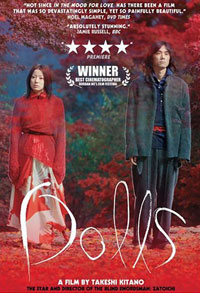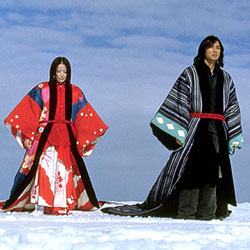 Dolls (2002) consists of three interwoven "cruel love stories," inspired by but not really based on Chikamatsu's bunraku puppet plays.
Dolls (2002) consists of three interwoven "cruel love stories," inspired by but not really based on Chikamatsu's bunraku puppet plays.
With amazing costumes by Yohji Yamamoto, there are times indeed when the actors in Dolls have the kind of bunraku-like articulated costumed glamor, & share with bunraku the same degree of artifice-as-heightened-reality.
Examples of films more directly adopted from Chikamatsu are Double Suicide (1969) & The Crucified Lovers (1955), which even just by their titles reveal the depth of tragedy in his storytelling.
When such doomful scenarios are acted out by puppets with physical atriculation that approaches human, it simultaneously heightens the dramatic intensity & thus the sorrowfulness, while yet distancing the viewer from unbearable anguish because these suffering beings are, after all, only puppets.
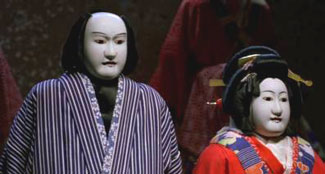 The film opens with an actual bunraku performance to set the tone & mood of aesthetic tragedy. The film opens with an actual bunraku performance to set the tone & mood of aesthetic tragedy.
When the first tale begins, the introductory dolls seem to be gazing at the first human characters to arrive. A young man & a young woman, beggars, are bound together by a long red cord, an instant image of mystery.
The "bound beggars" are stared at & made fun of by children & adults alike. Their distraught attachment raises so many questions, & to answer these, we go into a flashback:
Sawako (Miho Kanno) was thrown over when Matsumoto (Hidetoshi Nishijima) got the opportunity to marry the daughter of his company boss. Sawako in consequence attempted suicide. Although she survived, she has come out of it either brain-damaged or completely insane.
When Matsumoto hears of her attempt, he abandons his bride-to-be at the alter, & rushes to the hospital. He takes her away, intent on taking care of all her needs by himself.
She can never be left alone, so he abandons everything to focus on caring for Sawako. She has become childlike & wanders off easily, which is why he devises the mutual tethering.
They are soon living in his car, homeless, always sad, but it won't be long until they haven't even the car. As they're bound together but he doesn't want to frustrate her desire to wander, they set out in spring through trees at cherry blossom time, becoming the eternal wanderers.
In rendering such characters starkly human, there was the risk of making their exaggerated tragedies either too emotionally harrowing to watch, or even more unfortunately, inescapably comical with all existence portrayed as cosmic pratfall. Fortunately the stylistic sumptuousness & symbolism of the presentation insures it is neither afflicting nor unintentionally funny.
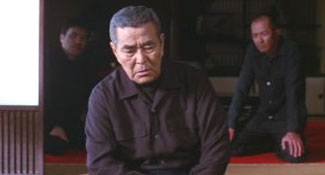 Director & screenwriter Takeshi "Beat" Kitano is better known for his gangster films like Sonatine (1993), Fireworks (1997), Brother (2000), & many suchlike, not for such tender tragedies as Dolls. Director & screenwriter Takeshi "Beat" Kitano is better known for his gangster films like Sonatine (1993), Fireworks (1997), Brother (2000), & many suchlike, not for such tender tragedies as Dolls.
However, anyone truly paying attention knows even his violent yakuza tales have surprising moments of sensitivity, & for the second tale in Dolls he manages a cross-over of his filmmaking interests.
We are introduced to Hiro (Tatsuya Mihashi), a lonely, aging oyabun, or yakuza godfather. He practically laments, "In the old days, we got everything we wanted by force."
In a flashback, he remembers the day of a hit on a yakuza brother, which went horrifically, with lots of blood & death, including of a man he was close to.
There was also in those youthful days a girl he loved. He abandoned her go because a wife would've been in the way of his criminal career.
Now, as he nears life's close, he remembers her constantly. She had promised to wait for him at their usual rendezvous every Saturday, knowing he would eventually return. Though it's absurd to think so, he nevertheless wonders if she is still waiting.
So all these decades later, he returns as an old man to their trysting place in the park, nostalgic for love lost. And there he meets "the lunchbox lady" (Chieko Matsubara) who waits every Saturday with two lunchboxes, one for her absent love.
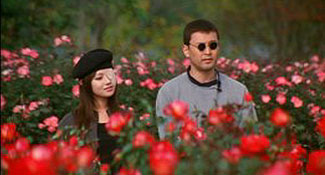 In the third tale, a blind man, Nukui (Tsutomu Takeshige), sets out for a meeting with the once-famed singing idol Haruna Yamaguchi (Kyoko Fukada), who became reclusive after an accident cost her an eye & her beauty. In the third tale, a blind man, Nukui (Tsutomu Takeshige), sets out for a meeting with the once-famed singing idol Haruna Yamaguchi (Kyoko Fukada), who became reclusive after an accident cost her an eye & her beauty.
She had a wonderfully appealing hit song which he had seen her sing in her heyday. In the flashback he's a bit laughable, as he's rather mature to be the number one fan of a girl whose music is aimed teeny-boppers. So he's a little weird.
His apartment is decorated with kitsch in homage to his favorite singer, so that it looks like his place belongs to a teenage girl. He's horrified when news comes of her car accident, & he was distressed that she went thereafter into permanent seclusion. He has tried since to get a meeting with her, & she has finally agreed, for one very clear reason.
[SPOILER ALERT] Borrowing an idea from a famous Kawabata story Okoto to Sasuke (1961), our borderline stalker blinded himself so that Haruna would agree to see him, knowing he would thus always see her as the beauty she had been.
There are no inter-title cards setting these three stories apart as separate short films. They are distinct yet of a single piece, with the tales somewhat interwoven:
The gangster boss ends up sitting on the bench, unrecognized, beside the "lunchbox lady" who waits for him. The bound beggars continue their perambulations of misery. And the pop star with the scarred face really does befriend her blinded fan.
It could all have ended with these sad or bittersweet little climaxes, but the codas continue a little further than any one story required. The blind fan gets run over & killed, so will never benefit by the budding friendship with the object of his devotion. The yakuza godfather successfully courts the woman who never recognizes him, but is assassinated in the yakuza world. The bound couple drag themselves inexoribly to the finale that was Chikamatsu's favorite climax. [END SPOILERS ALERT]
This is not a tightly edited perfectly made film, & the last half hour especially meanders unnecessarily. In its entirety it's a bit obvious in story development, though prettily done. It's a good film, but my expectations were that Kitano would do much better when breaking away from gangster films for something artful & serious. Although he did not create something magnificent, he did well enough that this film is easily recommendable.
copyright © by Paghat the Ratgirl
|
